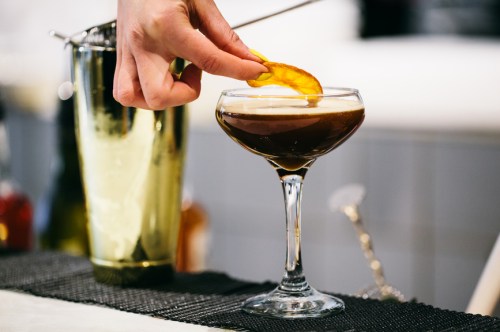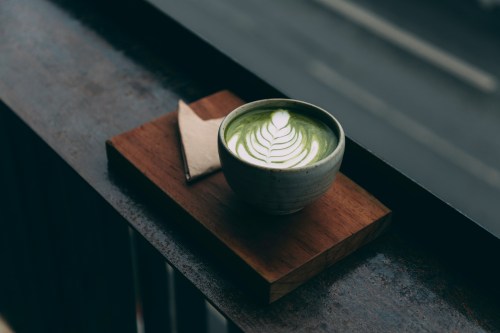Boozy drinks that blend caffeine and alcohol have been popular for decades. Whether it comes in the form of an espresso martini, a creamy Irish coffee, or a vodka Redbull, many can confirm at least one experience—fortunate or not—with this firecracker of a combination.
Experts in This Article
registered dietitian nutritionist and co-founder of FWDfuel
Scott Hadland, MD, MPH is the chief of the division of adolescent and young adult medicine at MassGeneral Hospital for Children, a member of the Mass General Brigham.
But ever wonder what actually happens to our bodies when we combine caffeine with alcohol? Turns out it impacts a heck of a lot, and not for the better. Here’s what doctors and dietitians have to say.
What happens to your body when you mix caffeine and alcohol, according to experts
1. Mixing caffeine and alcohol can make you feel less drunk.
According to the CDC, when alcohol is mixed with caffeine, the caffeine can mask the depressant effects of alcohol. This can make you feel more alert and less drunk, which can cause you to consume more booze than you would otherwise. This cycle is hugely problematic because it can lead drinkers to be more likely to become impaired, thereby increasing the risk of alcohol-attributable harms.
In support of this, the CDC highlights a study among Michigan high school students that found that those who binge drank were more than twice as likely to mix alcohol with energy drinks as non-binge drinkers (49 percent vs. 18.2 percent), and drinkers aged 15 to 23 who mix alcohol with energy drinks are four times more likely to binge drink at high intensity (defined as six or more drinks per binge episode).
2. Mixing caffeine and alcohol can cause major dehydration.
Since both substances cause dehydration, combining caffeine and alcohol causes a double whammy of dehydration. “In fact, they’re likely to cause even more dehydration than either would alone,” says pediatrician Scott Hadland, MD, MPH, chief of the division of adolescent and young adult medicine at MassGeneral Hospital for Children, a member of the Mass General Brigham system. “It’s important to know, too, that even when someone drinks a lot of fluid while consuming alcohol—like, for example, when someone drinks several beers—much of that fluid is quickly eliminated in the urine, so dehydration remains a risk.”
Not only does this mean more trips to the bathroom for the drinker, but it means their liver and kidneys are working harder. “The combination of caffeine and alcohol can also lead to loose stools. This will cause you to lose even more fluid through your gut, which further worsens dehydration,” Dr. Hadland adds.
3. Mixing caffeine and alcohol can impact your gut health.
Speaking of the gut. “Your baseline gut status will of course make a big difference in any situation, but generally speaking, caffeine and alcohol provide virtually zero benefits for our gut bacteria and can, in fact, inflame the intestinal lining,” says Kylene Bogden, RD and wellness advisor for Love Wellness.
“As much fun as alcohol may be, it does have its share of negative health effects, especially for the stomach and the esophagus,” Niket Sonpal, MD, a New York-based internist and gastroenterologist previously told Well+Good. Large quantities of alcohol can cause gastritis, or the form of stomach inflammation that Bogden mentioned. This can lead to heartburn, acid reflux, and sometimes long-term esophageal damage. “Once [the alcohol] leaves the stomach and gets metabolized, it hits the small intestine.” From there, Dr. Sonpal says that alcohol can damage the stomach’s lining known as villi, making it harder for you to absorb essential nutrients while simultaneously killing off both good and bad gut bacteria. “The bad bacteria tend to grow more, and so we ended up getting a mismatch of the microbiome as well.”
According to Dr. Hadland, there is a lot of evolving research on the relationship between alcohol, caffeine, and gut health to come, and he notes that we’re likely to learn more in upcoming years about the ways that this combination can throw off the balance of healthy and unhealthy bacteria in the gut microbiome.
4. Mixing caffeine and alcohol can impact your heart health.
In the short term, Dr. Hadland says that this combination can increase your heart rate and blood pressure, largely due to the caffeine. “This typically resolves after alcohol and caffeine are eliminated from the body, however, the dehydration that commonly results from alcohol and caffeine consumption can cause your heart rate to remain elevated longer,” Dr. Hadland says. While he notes that these changes tend to resolve, in the long term, some people who drink alcohol heavily and consistently will develop weakness of the heart muscles, which can cause heart failure.
5. You’re more likely to get a bad hangover when you combine caffeine and alcohol.
Everyone’s tolerance and processing is different—while some have the ability to metabolize caffeine and alcohol very quickly, others metabolize them more slowly. Bogden underlines that those that tend to metabolize at a slower rate are more likely to experience stomach aches, migraines, and other side effects associated with hangovers. “Additionally, both alcohol and caffeine can be hard on the protective layer that lines the stomach and can cause stomach upset and acid reflux plus, as a result of the dehydration caused by this combination, hangovers may be more likely,” says Dr. Hadland.
So, what now?
Given the popularity of boozy beverages that combine alcohol and caffeine, we aren’t likely to see them go away, and they can be enjoyed in moderation. All of the experts we consulted state that both alcohol and caffeine in small amounts are commonly consumed by people and usually this is safe, but it’s important to be aware that combining them increases risk for some of the effects outlined above, and drinking either in large quantities does too.
It’s also important to note that everyone responds to both alcohol and caffeine in unique ways. “It can be really difficult to determine how a person will respond to alcohol and caffeine—gender, body type, genetics, lifestyle habits, and even the sugar content of drinks can affect your own bodily response. This is in addition to an individual’s personal tolerance to alcohol and caffeine, which tend to be higher in people who use them more frequently,” says Dr. Hadland.
Bottom line: It’s important to understand your caffeine and alcohol tolerance before indulging in a drink that combines the two. If you are going to imbibe in such a drink, Bogden suggests drinking on a full stomach to improve digestion and therefore lessen the negative side effects. And don’t forget to hydrate!
Oh hi! You look like someone who loves free workouts, discounts for cutting-edge wellness brands, and exclusive Well+Good content. Sign up for Well+, our online community of wellness insiders, and unlock your rewards instantly.
Sign Up for Our Daily Newsletter
Get all the latest in wellness, trends, food, fitness, beauty, and more delivered right to your inbox.
Got it, you've been added to our email list.









